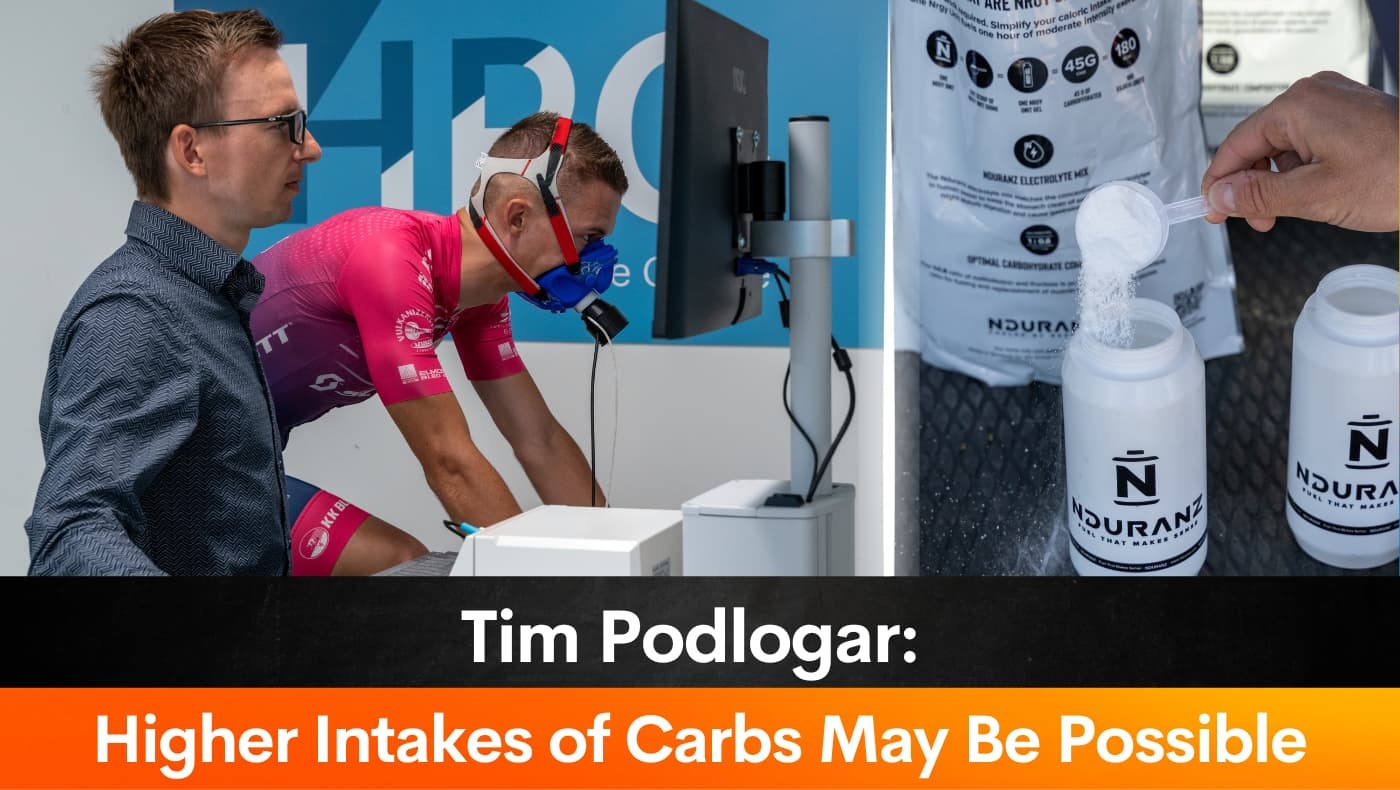Endurance athletes rely on carbohydrates during intense exercise to sustain energy levels. While most guidelines recommend consuming up to 90 grams of carbohydrates per hour, some athletes are pushing the limits, consuming more.
This raises an important question: Can the body absorb more than 90 grams of carbohydrates per hour? And if so, does it offer any performance benefits? These are the questions our Head of Science, Dr. Tim Podlogar, explored in collaboration with the Human Performance Centre.
Why 90 Grams Per Hour Is the Guideline
Carbohydrate absorption in the body relies on specialized transporters in the small intestine, each with a specific capacity.
- SGLT1 and GLUT2 transporters absorb around 60 grams of glucose per hour.
- GLUT5 transporters absorb approximately 30 grams of fructose per hour.
This combined capacity of 90 grams per hour forms the basis for current fueling guidelines. Consuming more is thought to be unnecessary, as excess carbohydrates would not be absorbed effectively.

For more detailed information, read our Fueling Guide.
Can Higher Carbohydrate Intake Improve Performance?
Dr. Podlogar explains:
“Lately, there’s growing interest in consuming 120 grams or more per hour, particularly among well-trained athletes. In theory, this could increase the amount of carbohydrates absorbed and used.”
Indeed, many professional teams already consume 120 grams per hour during intense efforts. But does this higher intake translate into measurable performance gains?
Putting It to the Test: 90g vs. 120g Per Hour
Dr. Podlogar and his team conducted a study comparing the effects of consuming 90 grams versus 120 grams of carbohydrates per hour.
The goal was to determine the quantity of carbohydrates endurance athletes are actually able to oxidize, and gain insights about overall carbohydrate and fat oxidation.
They had two hypotheses:
- An intake of 120 grams of carbohydrates per hour will allow you to use more carbohydrates. This means you will be able to eat, absorb, and use more energy.
- Consuming more carbohydrates will slow down glycogen breakdown, i.e. the carbohydrates stored in your body. This should lead to an increase in endurance during longer exercise, as you will retain more energy in your body.
The Study
To test their hypotheses, they conducted a study with well-trained cyclists. The cyclists had an average power of 265 watts during three hours of cycling, which is comparable to professional cyclists.
Dr. Tim Podlogar and his research team wanted to test in practice the intake of 90 grams compared to 120 grams of carbohydrates per hour.
Key Findings
1. More carbs absorbed but no glycogen sparing
"We determined that you can in fact use more than 90 grams of carbohydrates per hour," explains Dr. Tim Podlogar.
"Unfortunately, we couldn't confirm that this leads to glycogen sparing. This means that in the end, you'll use the same amount of glycogen whether you consume 90 or 120 grams per hour. We speculate that the reason is that consuming more carbohydrates doesn't slow down glycogen use but only slows down fat use."
2. No performance boost
“Consuming 120 grams per hour didn’t result in better performance compared to 90 grams per hour.”
In practical terms, the same amount of glycogen was used regardless of intake.
Further Insights: Does Carbohydrate Ratio Matter?
The team tested also tested two different carbohydrate ratios in their study.
- For 90 grams of carbohydrates per hour, they used the 2:1 ratio between glucose and fructose.
- For 120 grams of carbohydrates per hour, they used the 1:0.8 ratio between glucose and fructose.
"We used two different ratios because glucose absorption is supposed to be limited to 60 or 66 grams per hour. For this reason, using the 2:1 ratio at 120 grams per hour would exceed this natural limit and the glucose could not be absorbed," explains Dr. Podlogar. "The higher the intake of carbohydrates, the more we are forced to gravitate towards the 1:1 ratio between glucose and fructose, in my opinion."
"According to research and my experience, 1:0.8 remains the best ratio between glucose and fructose," concludes Dr. Tim Podlogar
Should You Consume More than 90 Grams Per Hour?
For most athletes, the answer is no.
The study shows that higher carbohydrate intake does not slow glycogen depletion.
As Dr. Podlogar says, “For non-elite athletes, 90 grams per hour is more than sufficient,” says Dr. Podlogar. “That’s the intake I personally stick to. There's no point going beyond.”
What about elite athletes?
In theory, consuming 120 grams per hour could be beneficial when glycogen stores are fully depleted, such as during ultra-endurance events.
Dr. Podlogar explains, “Once (glycogen stores) are fully depleted, being able to absorb and use 120 grams of carbohydrates per hour instead of 90 grams could result in improved athletic performance.”
However, this benefit is speculative and requires further research. And, even if it does prove to be true, Dr. Podlogar doubts it would make a huge difference.
For now, it's safe to say that there's no objective reason to push beyond 90 grams of carbohydrates per hour.
Study link: Podlogar, T., Bokal, Š., Cirnski, S., & Wallis, G. A. (2022). Increased exogenous but unaltered endogenous carbohydrate oxidation with combined fructose-maltodextrin ingested at 120 g h-1 versus 90 g h-1 at different ratios. European journal of applied physiology, 122(11), 2393–2401. https://doi.org/10.1007/s00421-022-05019-w

